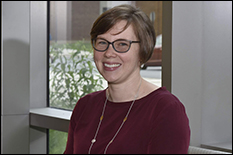Maisel Applies NSF CAREER Award to Advance Drug Delivery Strategies
Fischell Department of Bioengineering (BIOE) Assistant Professor Katharina Maisel was named a recipient of the National Science Foundation’s Faculty Early Career Development (CAREER) award. The five-year, $650,000 award will support Maisel’s efforts to develop drug delivery strategies to improve the efficacy of vaccines and immunotherapies. Such therapies target the immune system and can range from classic vaccines to immunotherapies that treat disease by activating or suppressing the immune system. For decades, scientists have shown that targeting therapies to the lymph nodes – the body’s immune system “command center” – can significantly enhance the efficacy of both vaccinations and immunotherapies. Such methods to target the lymph nodes typically rely on direct injections, but researchers like Maisel are taking another tactic. Similar to how blood vessels carry blood throughout the human body, lymphatic vessels carry lymph, a fluid largely composed of white blood cells and antibodies that plays an integral role in the body’s defense against viruses and other pathogens. Knowing this, Maisel and members of her Mucosal Associated Immune System Engineering and Lymphatics Lab are investigating how they can use small nanoparticles to tap the lymphatic vessels’ transport function to deliver therapies to the lymph nodes. Maisel and her team are exploring how the material properties of tissues – such as shape, surface chemistry, and fluid flow – affect how nanoparticles can be used to transport a payload via the lymphatic vessels. The group’s hope is that they’ll shed new light on design criteria for developing vaccines and immunotherapies that noninvasively target lymph nodes. “We are incredibly excited and grateful to have received NSF funding support for this work,” Maisel said. “Our aim is for this to set the foundation for many different applications we hope to explore in the future to improve the efficacy of therapeutics to treat and prevent disease.” Compared with traditional therapies, lymphatic transport-targeting nanoparticle therapeutics could provide longer protection against pathogens or enhance the body’s response to cancer immunotherapy – all while reducing side effects and required doses. “Our main objective is to affect how the human body formulates an immune response so that we can design treatments that prompt the most effective response to combat or ward off disease,” Maisel said. “This is so important for the future of all sorts of therapeutics, ranging from immunotherapies to treat cancers or allergies, to vaccines. Over the past several months, especially, the coronavirus pandemic and questions surrounding vaccine efficacy have further demonstrated how critical this area of research truly is.” In addition to her research aims, Maisel plans to apply her NSF CAREER Award toward promoting the inclusion and retention of underrepresented groups in engineering. “Accessibility in engineering is still far below that of the general population, and research has shown that representaion in research teams increases creativity, achievement, and outside-the-box thinking,” Maisel said. Recognizing this, she developed an approach that builds on two main principles identified to aid in the recruitment and retention of broaden groups in STEM: mentorship and leadership. “My aim is to build generational and peer mentorship programs, increase dissemination of mentorship training programs, and design broaden education modules to educate the next and current generation of scientists on promoting accessible environments,” Maisel said. “Even more, I hope to build early-stage interventions by partnering with rural elementary schools to recruit women and underrepresented groups into STEM careers.”
Related Articles: February 2, 2021 Prev Next |


